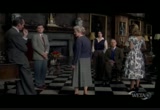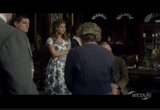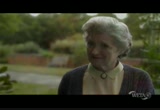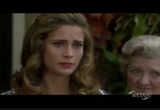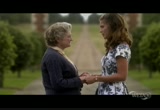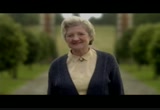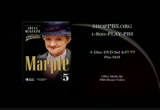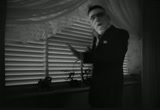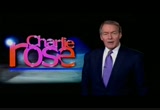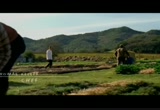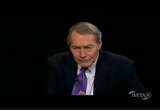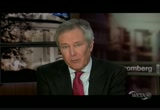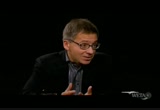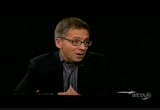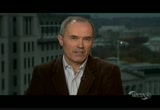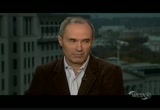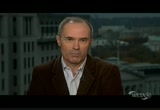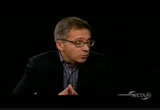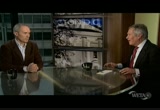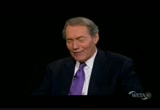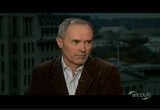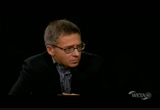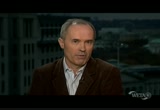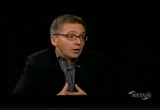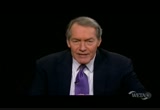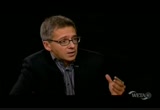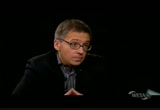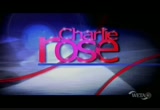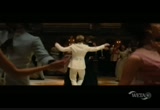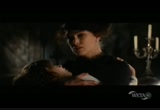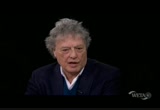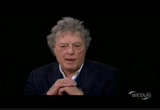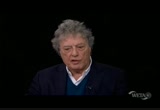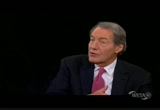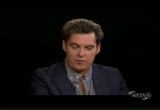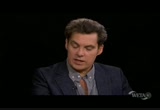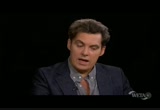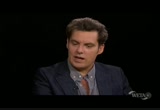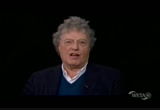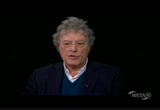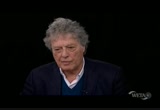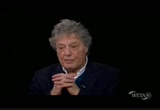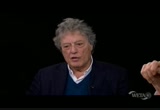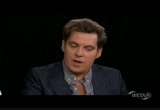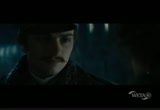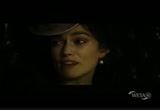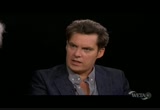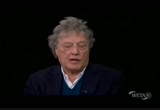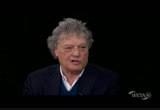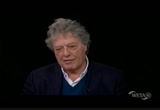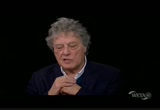tv Charlie Rose PBS November 16, 2012 12:00am-1:00am EST
12:00 am
frame one for the killing of the other. caterham: cade is no good. you said as much yourself. and as for this plan to ship you off to africa... now, don't look at me like that. you cannot build a marriage on lies. aren't you supposed to build it on love? and treadwell? as we thought. poisoned not by the foxglove leaves but by... your tonic. finch: active ingredient: digitalis. a huge overdose. i-i do regret that. she was a faithful servant. more faithful than you knew. you were so fearful that she would tell the inspector about the affair. on the contrary. she was taking measures to protect her mistress's secret. as soon as agnes's bones were recovered, she took the letters from amongst your possessions to her own room. if i'd let her live,
12:01 am
no one would have found out. is that what you mean? well. that's it, then. not quite. virginia: daddy? return one day for the greatest jewel. no-- stop. what if this jewel was a diamond of a different kind? stop! whatever it is, we have a right to know. a rose. miss marple: not just any rose. virginia: the richmond rose. "richmond twenty north three east." so the richmond referred to is not the portrait. precisely-- the rose of richmond. (softly): ahh. well, these directions? where did they lead?
12:02 am
nine, ten, 11, 12, 13, 14, 15, 16, 17, 18, 19, 20... one... two. i don't understand. jane? the count's last words. do you remember? der wand. the wall. we thought he meant the wall in the passageway. bu... this virginia creeper, when was it planted? madeleine planted it 23 years ago to celebrate your birth. virginia creeper. he knew, i'm sure he did, as he lay dying. the rose, the dance. it all made sense. i think your mother wrote to the count
12:03 am
12:04 am
i feel, if you were to let go now... i won't. i'd just float off, you know. i won't. come on. no use putting off the inevitable. are you going to tell her or shall i? oh, i... i think it's best coming from me. blenkinsopp! oh! oh, dear! oh, dear. bundle won't like that at all. but you're not selling chimneys? virginia: well, bundle couldn't bear to stay on, and i don't want to live here, so, what do you think? pass the whole headache on to blenkinsopp and her tea and scones.
12:05 am
why not? will she be all right? bundle, i mean. virginia: oh, she'll foist herself onto some undeserving cause. miss marple: her father? i suppose. and you? here they come. a happy marriage. it can't be that difficult, can it? go with your heart. like mother? i keep thinking if she loved her count so much, why was she so quick to believe he'd run off? i suppose love is an act of courage. yes. miss marple. good-bye, inspector. thank you. i see now i've grown too fond of my own reputation. i was so bewitched by the blasted diamond. and now look at me.
12:06 am
the latest of your casualties. what do you think? oh... interpol want me to take it to south africa, entrap this villainous fellow from praetoria. you know, inspector, i don't care for it at all. good-bye. funding for masterpiece is provided by: created to ensure the series' future. with support from donald and darlene shiley. explore new worlds and new ideas
12:07 am
12:11 am
united states and china fundamentally on political values on differences in economic system are going to be at least as great when china becomes the world's largest economy as they are today. >> and that is the biggest challenge we have. >> rose: we continue with anna aristotle the classic tolstoy novel, it is visited in a new fill adaptation, we talk to the play right and joe wright, the director. >> i kind of treated tolstoy like an equal, he is an extraordinary vein thing to attempt on my part but actually it is sort of a version of respect, because you are not doing him a service by trying to transmute one kind of art form into another.
12:12 am
12:13 am
and by bloomberg, a provider of multimedia news and information services worldwide. from our studios in new york city, this is charlie rose. captioning sponsored by rose communications from our studios in new york city, this is charlie rose. >> rose: once every ten years china changes its government, they do it the party congress in beijing, xi jinping was named president and chairman he succeeds huh engine too and chose six people who will run china, the six members of the standing committee of the politburo, many questions about china and the new leadership one is about the growth of the economy and others is about the tension in the country between urban and rural, conservative and liberal, many are concerned about the demographics of china,
12:14 am
others are worried about the conflict with japan and always there is a question of the relationship between china and the united states. we talk about all of those questions this evening with ian bremmer, he is the president and founder of the eurasia group from washington, richard mcgregor of the financial times, the author of the party and jim fallows of the atlantic, his book china airborne came out earlier this year, i am pleased to have each of them on this program. richard mcgregor tell me, where does china go from here? and what are the questions we should be asking about the new leadership, both in terms of xi jinping and the standing committee? >> well, the first thing is to assess what kind of body the new standing committee is and in many respects, ostensibly it is quite disappointing some of the people we would consider to be more liberal, i mean it is very hard to categorize people in china as reform mist and conservatives but, which are rubbery term but some of the
12:15 am
more liberal and nationally minded people did not get on and that would be disappointing for many people. the second thing is, you know exactly what, you know, political personnel xi jinping has and exactly what power will he have as an individual as general secretary of the party and that might be answered for at least, may not be answered for one or two years. one thing we can say about xi jinping it will be a vastly superior representative of china on the world stage than huh engine too his predecessor, he also zoomed seemed to have a car irs ma bypass, he had no personality, he had no ability to speak off-the-cuff. and xi jinping seems altogether a more comfortable, larger, more interesting figure to represent china on the world stage. >> rose: james fallows you seem to be nodding in some degree of agreement. >> yes, and partly because richard mcgregor is one of the world's great experts in the chinese communist party and the leadership struggles therein and
12:16 am
also because i would agree from my modest per perspective with the points he was making. what is interesting is to me is the tension and time scales we have here, on the one hand almost everything you observe in china there most, i was there most recently two weeks ago is mounting precious, short-term economic issues, long-term economic transitions, public protests on labor issues, pollution, corruption and all the rest, these require some kind of agility from the government, on the other hand as he was saying it is a multiyear process of doing things and it won't be until the next a five years turnover of the standing committee some of these more reform type figures may come in, so whether the party will be able to manage this next step of being able to respond as agilely as the country needs and to a different sort of demand in the sheer growth of an earlier time, with this somewhat upon drowse structure and, ponderous structure .. that is what commands attention here.
12:17 am
>> i am bremmer? >> this is. >> ian bremmer. >> in is a country trying to manage a 21st century economic with a 20th century political system, it is slow and ponderous and it is organized by consensus. but the people who have much more information about just how corrupt, howe opaque these decision-making processes occur have much more awareness of the fact that the party has to change, and yet when you see the statements that are being made by xi jinping, and i willly that there have to be changes, corruption is a real problem, we need reforms, there are no differences in what we have seen five or ten years ago and i think that frustration is growing on the ground in china. the growth is extraordinary, there is no question, and we can be very impressed with what china has accomplished but their ability to continue to accomplish that over the next five years with this leadership is something i think everyone is
12:18 am
questioning, not just here in the united states but much more importantly within china itself. >> rose: let me talk about other people who might have some influence, wang qishan. >> we saw of course he was there, and played a significant role in the initial party congress. and he also made a number of the appointments that are on the now seven person standing committee, there are folks who are directly proteges of him, and clearly, if you think about, you know, the respect for the party elders and wanting to show that the communist party there is going to be no challenge to it, one of the biggest statements that has been made all the way through here is there will be no questioning of the sanctity of the communist party system. political reform, many have wondered whether or not we will ever see any sort of openness in the political chinese system. what we now see is we know who the leader are going to be for the next five years and we know who the leaders are going to be
12:19 am
in the united states for the next four. the differences between the united states and china fundamentally on political values on differences in economics system are going to be at least as great when china becomes the world's largest economy, as they are today. >> and that is the biggest challenge we have in the world. >> what about xi jinping, richard? >> >> he just appears rather ignominious end, there is one school of thought that will tell you he is the ultimate party functionary or bureaucrat, respects process, and he wanted to go out cleanly and not on a military response as they had in the first years and something which really, you know, a lot of people were very upset about in china. but really he not only was he shunted out of the military spot on day one, he couldn't get many of his best people up into the follopollitt bureau standing
12:20 am
committee and we have the ghost of the fact he stepped down after a serious illness, not only .. manipulating the congress from behind the scenes but right in front of our eyes, and this is not meant to happen when, we were not meant to have the elders, the council of elders being so obviously involved, and i think that was pretty surprising and interesting. >> rose: jim? >> yes. i want to add something to that. it is remarkable for a society that has become so modern, so transparent, so-so fist indicated in so many ways, they just complete a they krot my process staggers the nation, i was watching last night as ushering out the seven people in the new standing committee and all of the observers weren't sure who they were going to be and whether it would be seven or nine. they are sort of looking at the marks on the stage to see if there were seven or nine marks up there. and really the only process that is comparable to anywhere in the
12:21 am
world is selecting a pope and to have the world's most populous nation going through this, i think to the people in china itself, they are ready for something more than that. >> and we might add, charlie, we don't even get the puff of white smoke. >> rose: how about the presence of wang qishan. >> that is interesting as well because wang qishan is a forceful character, he has done a lot of tough jobs in beijing during the debt crisis, but he has been knocked down the order and the best explanation for this is that he is an economics person and a finance person but he is being put in charge of anti-corruption, because the premiere, who will be in charge of the economy, li keqiang felt threatened by or his supporters felt threatened by him so he is really being put in a job that he is not best suited to. so that technocratic elites we
12:22 am
have seen coming through have been kind of shut shunted or put slightly out of place. the other explanation for him being there, of course, and this is rather machiavellian and programs unfair, assort of a member of the princeling class he is there to protect the princelings but i think that is a little bit nate and con sfir tomorrow. >> it is difficult because everything was home he would li keqiang would get the major financial portfolio and some china watchers say this is a big disappointment if you take it at face value and dealing with corruption is number one otherwise the party cannot continue to survive you say someone who is both reform mist minded as well as plain spoken, relatively plain spoken and charismatic in charge of corruption shows .. they will actually start taking steps and moving to deal with the extraordinary concentration of wealth that exists among the top party elites. having said that, if they don't make those steps in a matter of
12:23 am
months, then i think people are going to say that this economic reform process, will still be incremental but we won't see anything fundamental for years. >> rose: where is the power of the military in this equation? richard? >> well, it is hard to say, i mean, it is hard to say, i mean, in terms of the military party relationship, tao promoted a some of his favorite generals so in that respect you can argue his influence has an entire, hasn't entirely dissipated, the military has long been banished are the standing committee itself so that new tradition is being maintained, and it is hard to see the military's fingerprints on anything in particular, but, you know, in the broader context of chinese politics these days, and the chinese economy and the chinese foreign policy, the military has a larger role and wrapped
12:24 am
themselves in the flag of patriotism and corruption against the u.s. and on the taiwan issue and against japan, so the congress has taken place against a backdrop of rising military influence. >> rose:. >> and if i could ask richard on that to me it was a sign of some kind of order in the chinese process, rather than disorder to have this clean handover, the chairman of the military commission of not having jintao hang around for a year or two, it is a modest step of transparency and institutionalization? >> i think you can definitely argue that this basically reflects well on the system, they don't have the former leading hanging on by his fingernails in another important post, that is true. but -- and that is why some people compliment jintao for respecting the process but in ordinary power politics term, it certainly shows that jintao was a much weaker leader than we thought. >> we have never seen foreign
12:25 am
policy statements from li keqiang be, scituate. >> we don't know how assertive the military should be. >> rose: reform. >> we don't know, that's what really comes -- and you have one of the best in the world, but at the same time, this there is a lot of guesswork going on with what clearly is going to be the most important political trants situation any of us will deal with over the course of the next few years. >> raped, every time they compliment you i feel i must go to you when i turn the conversation. so there is the name that wasn't there who wanted to be there, boshi li. >> well, not only he wasn't there, he was in some sort of safe house or in a soft cell out on the outskirts of beijing wondering what might have been, i wonder if he was watching on the night or has a tv set in his cell, but that has been -- this year was one of the really disappointing things about this career was the fact that the level of secrecy we just talked
12:26 am
about, that medieval sort of control in the last, theatrical last-minute staging is no different than five or ten years ago, and i wonder if the politics hadn't been so turned upside down in china this year by the bolishi case if they had more time on making the process more open, but i think the bolshili case made them bat ten down the hatches and proceed as normal. >> i think another name whose absence people noticed yan 1 or the more reform minded officials programs if there was a nine committee, nine person committee he may have been included. it is a five-year cycle before anyone gets added, and when they bet to 68 they can't be disappoint disappointed, and so that is also a downbeat indicator. >> think about how long five years is in terms of the pressures china is going to be
12:27 am
under, domestically from their own people now, you have about 360 million on the chinese twitter, about since hundred million on the internet aware of all of these transitions, the challenges they will have in terms of the rapacious commodities appetites and the impact it will havavavon the ret of the world, the conflict with japan, in particular between china and japan, the world's second, third largest economies as well as the threats with western internationals that feel they are having a challenge with chinese enterprises we talked about this many times before, but the feeling was always from those that were pushing back, the chinese are reforming away from the system, not a meaningful way for the next five years. no one serious would argue that now, five years is a very, very long time in this environment. >> rose: will they in the next five years be able to move this from the sort of exporting economy model to a domestic demand model? >> i mean, the distinction between reformers and conservatives is a bit of an artifice, everyone that is
12:28 am
meaningful in china that runs the country knows that they have to shift and trance form the economy, but the fact that someone is in favor of reform does not mean they are in favor of free market reform. so clearly there is going to be a lot of interest in redistributing wealth and whether or not they can move on that is an open question. but trying to ensure that folks, more people get into the middle classes, there is less dissent and less dissatisfaction with their lot in life as growth in china slows. >> rose: can the communist party as it exists today in its closed way, how long does it have? >> i have an answer for that. as i think i have discussed with you before, charlie, one of the main impressions to me of living in china opposite things are always true, it is wonderful and horrible and uplifting and discouraging and all the rest, the same is true of the communist party, it has to reform and it can't reform and so how the tension between those two -- i can argue both of those cases at great length, it simply has to survive but also it
12:29 am
can't, so which of those will give is what makes it both important and fascinating to watch. >> rose: richard? >> i mean, i certainly would always give them credit for being, i mean, obviously on the surface, very monolithic and dark and closed and opaque but under the surface i think there is a great self-awareness about china's problems, they know much more than we do and a much greater ability to be flexible and i think we always see, i mean you often hear a lot of talk about the tens of thousand of protests that you see every day in china and certainly every davy traveled somewhere in china and see a protest but in fact they are much smarter at dealing with this sort of thing than they were five, ten years ago. the same goes with the economy. even as a last six months we start seeing the restart or the start of some financial liberalization which is very important, and i think in terms of, you know, reweighing economic growth that is happening a little, not too much, but certainly in the last year when the economy has slowed down they resisted another new
12:30 am
stimulus. you know, the model doesn't last forever. but i still resist the notion that in the next five years it all comes crumbling down, because there are too many people the invested in the system, even those who aren't actually in the party itself. >> i think the likelihood it falls apart in the next five years is very low the likelihood that growing pressure lead to actions on the part of the chinese party that are problematic, particularly for the united states and for those around them, that is much higher. they are not going to respond to us and i think that as you look at what china looks like, a monolithic party structure system and if you go to change high where people make $20,000 a year and to the superior hundred of millions of folks who are surviving on less than 1,000, you see two different countries. and .. this is a government that is not prepared to provide two completely different political responses to folks that have
12:31 am
radically different demands. if you are living in shanghai you are not concerned about ten percent growth every year, but you are concerned about the quality of, you know, sort of the formula you are giving to your children and whether or not leaders are being responsive to you, that is radically different than what you are experiencing for hundreds and hundreds of millions of people in the interior of the country. >> rose: and finally there is this, we have an election in the united states, and we have had a choice of new leaders in china. what do they want from each other, jim? >> i think surprisingly for all of the turmoil on both sides this has been the most constant part of foreign policy in the u.s. since the nixon era and on the chinese side and i think there is some lucid sense of self-interest on both side, what the u.s. wants is a china both continues to develop because the world is better if it does that and also becomes more mature, quote unquote in its international responsibilities and in its management so we hope
12:32 am
it keeps on the generally liberalizing path it had, i think what the chinese want is that we give them room. i, they would rather not get in ahead on collision in with us. >> the greater instability in china makes them more desirous, more wanting, a more stable relationship with the united states, i mean that is one of the, you know, china has been allowed to grow because of what they call a stable international environment, in fact the forward deployment of the military in north asia has been a great stabilizer and a great enabler of chinese growth, and i don't think they are looking for a fight, but as ian mentioned the situation with japan is especially worrying and with follopolamalu petitions on boths struggling to get off their high horses so there is no doubt we could see something, even a shooting some kind of exchange of fire with japan, but in general, i think xi jinping wants good ties or at least stable ties with the u.s.
12:33 am
>> charlie could i add one thing with japan? the biggest thing from china when i went there in the mid eighties when i was living there the last few years is how much higher is the level of anti-japanese feeling, especially among young people and especially manufacturers by the government, it really, is it takes you aback and it is dangerous. >> it is an easy one because the. >> the investment into china, they don't need japanese technology, they think they can get from the south koreans and the japanese. >nd. >> that is the easy way to go, nationalism. >> and at the beginning of the year, u.s. china transitions are what we have to watch out for, it is that the japanese transition coming up which is likely to move in a more nationalist direction is with the one that does unseat this triangular relationship, the u.s. and china together certainly do not want unnecessary conflict. the danger is that the likelihood of necessary conflict, a real war between the two, real territorial issues
12:34 am
that are bringing american allies in greater conflict with china and this fundamental difference in economic system between our corporations and theirs, are driving us towards a much more acrimonious relationship and let's remember one thing obama did say for the first time during this last u.s. foreign policy presidential debate is he called china and adversary. that is new and yes there is a bit of politics there, but it also reflects the fact that it is not our chinese friends anymore, and this is, this is going to be a real challenge. >> rose: i mean the interesting thing though, and i will just touch on this, can we, because there is new leadership and because they know america better than previous leadership and therefore there is less miss perception hopefully, is that a net plus? jim? >> i would say, yes and i think that as richard was saying earlier, just the personality of scituate will seem much more accessible to americans and westerners, than jintao so there
12:35 am
is a steadily deepening understanding and interaction between the countries, notwithstanding these other tensions. >> rose: richard? >> of course, of course traditionally the chinese have preferred republicans, but i think they are much happy that mr. obama beat out mr. romney. >> rose: you have a point there, based on what mr. romney said he would do in the first day. richard mcgregor, financial times, ian bremmer, you're eurasia group, stay with us, we will be right back. >> rose: sir and they have told tolstoy's anna karenina into a film, one against directed by jim wright and the movie find new ways to tell a love story that is familiar to all of us. here is the trailer for the
12:36 am
film. ♪ >> i got married but it was not love. we must all cherish him for russia's sake. >> romantic love is the last illusion of the old order. >> he is a rich, good-looking cavalry officer. >> i must warn you about something. >> warn me? >> you may find indiscretion, give the world a reason to talk about you. >> if you have any shortcoming you will give me back my peace. >> will will be no peace for us, only misery. there will be no peace for us. >> we are bound together by god
12:37 am
and can only be prone by a crime against god. >> it is not something, it is everything. >> you will destroy yourself. >> it is the misuse of something sacred. >> the man who can't govern his wife has gone as far as he can go in government. >> anna is not a criminal, she broke the rules. >> i want to live my life. >> you will be ruined. >> do you think i would let you have my son? >> you are a woman without honor and this is what zero you want. do you know what you want? ♪
12:38 am
>> i love you. >> rose: tom stoppard is considered to be one of our greatest living dramatist and famous for plays and arcadia's work as a screen writer such as the oscar-winning shakespeare in love is no less renown. >> joe wright had adaptation of pride and prejudice and followed up with that successful highly praised world hanna and atonement, i am pleased to have joe wright and tom stoppard here. great to have you back. >> where do you put anna karenina as a great novel? >> well, everybody, it is in everybody's top three or four, it is not where i put it. it is the most wonderful book. i didn't mean to imply i put it in the top 200. i really do think it is one of the dozen great novels. >> rose: because it is a great
12:39 am
love story. >> it has everything. >> rose: the history of russia. >> it is actually got at least two-love stories in it. it has a lot about russia as a society, as a political entity, and of course we read the translation and there are several of those now current. but it is the most wonderful control of many events, many characters and the energy in the book is deployed with genius. >> rose: you are not unaware to use the double negatives other have before have adapted it to movies and plays, what is the challenge for you? how did you approach this? >> well, in fact, there have been, as you know, a dozen anna kareninas, probably. my approach was to just see what was for me central, which was
12:40 am
love in infinite variety but certainly several manifestations, provide different threads through the book, there are choices to be made among the characters of lesson and kiki. >> there is a lot of stuff going on in the book about tolstoy's preoccupation with agriculture, with the philosophy of life and so on, and i just kept picking up on love, love between brothers, love between lovers, love between mother and child, and tried to make a point of that, really, which in a way simplified my task and there was less missing from such a big novel as you might suppose in the movie. >> rose: so nertsz you feel like you really got the essence of that, if your focus is on the love you have got the essence of it?
12:41 am
>> also, toll toy is a great polemic and essayist and he didn't make a distinction in himself between a novelist and editorial, and not to be disrespectful, bees in his bonnet, war and peace is not an exception. >> rose: right. >> and as for dramatic momentum and dramatic incidents, there is a lot of that this the book but it is not unmanageable, you tend to try to perhaps do without certain diversions, but the main current of anna karenina, i think, is in joe's movie, and it is a complex current, it is not just as it were two people or a triangle. there is a lot going on, and it is a busy, colorful -- i think
12:42 am
it is a terrific film, and i can say this with a certain amount of modesty, because it is a very audacious approach to telling a story, and it is joe's take on that, it is joe's audacity, and i was kind of a bit frightened of it when he told me what he intended to do. >> rose: because you had not written it the way he intended to adapt it. >> i wrote it as a movie script based on a novel. >> with all of the wide scope of geography in a great story of that time. >> yes. indeed. but as he will speak for himself, but what he has done is to, as it were, dare i say dodged the bullet of making the 88th immaculate costume drama. >> and having done pride and
12:43 am
prejudice as well. >> i was simply awed with what he was doing. >> rose: tell the story. >> well, we were looking at a lot of locations, both in russia and in the uk, and walking around those locations people, you know, in russia they would say oh, yeah we have shot seven anna kareninas before and in the locations in the uk they would say well we shot, you know, three car care are a nightly movies and i felt i was tread ago lot of the same old ground .. and so it came to the point where i really did feel like i had to do something different and explore some ideas i had over a number of years in terms of stylation .. and trying to touch the essence of the stories i am trying to tell.
12:44 am
so it is really a matter of not decorating the story but reaching the es sense of it. .. and with tom cease screen play, it was so the incredibly solid i could kind of do anything i liked with it, in terms of its setting, and it was very, very taught, and so what i chose to do was to really treat the screen play as if it were a play text in the same way you might take a kind of, you know, shakespeare, richard the third and set it in the myanmar public or take the script and keep it exactly as it was except set it in this limited set of locations. >> rose: how many locations? >> well, it is kind of postally, i mean the story works as -- two stories, the anna story. >> rose: right. >> and then the leven story and
12:45 am
he talked about a double helix that wound around each other and never really touched. and lesson levin's story should happen in a more cinema real world, since his story is real, and anna's story could happen in this kind of grand theatre. and when i think of pride and prejudice and atonement and now this, are you drawn to these kind of the great sweep of -- and huge themes of good novels? >> i am. i am drawn to good novels because i see my career as being a continuation of my education, and so i can learn from these great books, and certainly learn from people like tom, and so i also -- i also find that period novels feel to me like fantasies. i am not interested in kind of historical reenactment. i am interested in emotions and
12:46 am
the interior lives of people. >> rose: what did you learn from tom or how did he surprise you? >> tom surprised me by kind of sort of treating tolstoy as an equal. it was as if he kind zero got tolstoy down from his -- and statistic across the table like we are now, and they discussed, you know, and tom felt completely able, confident enough to be able to point out to tolstoy when he perhaps didn't get something quite right. >> you are listening to this like this is the first time you heard that observation from him. >> yes, i was thinking what it meant about me. and the fact is when i was a younger writer, doing screen plays, particularly, and i had the good fortune to write screen plays from novels of
12:47 am
distinguished authors and i was very, very deferential and quite rightly so, one should programs begin like that, but, in fact, my own feeling, my strong instinct is that it probably wasn't the best way to serve the book or the film. and it doesn't take a moment to realize that that is probably obvious. so i mean, joe -- i kind of treated tolstoy like an equal. which sounds like an extraordinary vein thing to attempt on my part but it is a version of respect, because you are not doing him a service by trying to transmute one kind of art form into another, without
12:48 am
taking account of what has to be gained and what has to be lost. i have lost -- in the last two or three years i have done that to two writers, and now, it just seems to me and i wish i had come across it more earlier, that your job is not to be fateful. that is not the primary job. the job is to transmute something into -- from one kind of story telling into another form of story telling. anna karenina is the superb novel, it does not entirely contain the constituents of i can'tmatic dramatic momentum .. when you are actually writing and making a movie. you have to do a certain amount of invention. not that much in the case of
12:49 am
anna karenina. i didn't feel thats i was going against things. against tolstoy's book in any radical way. joe did that in a sense by not trying to be a novelist on the film, but by being a film maker, which is what i find exciting about the results. there were certain things, and we don't have time to go into them, there were certain things which i was worried about anna's lover actually uses his service revolver to attempt to shoot himself through the heart in the novel and i was terribly worried about this, and if you actually look back at the movie so is everybody else wh who has made a karenina, the movie. and, you know, i came up with an idea which would somehow provide
12:50 am
the catharsis and the intensity of the moment without what i felt was a slight absurdity, and i found -- then i discovered another movie that had the same thought and then had another thought and actually shot something which was one of the first things -- it was early in the schedule, it is like that is okay but in the end we didn't do it, and i am not displeased by that. it is -- it has always bothered they but mostly, it is as joe says, those are temporary, historian literary figure who i think arose out of the arris stock i can't city, arris stock city, living their life on the stage gone and at the same time as joe said, the narrative involving the character called levin is much more
12:51 am
autobiographical for tolstoy, who was a man of the earth, i mean, he didn't come from -- he was a soldier, but he liked to get his fingernails dirty. and he -- as it were, he had a relationship with nature, which was intense, and meant a lot to him, because it was a relationship with god, as far as he was concerned, so the whole levin thing, the whole levin strand of the narrative, including whom levin falls in love with, wha what happens in t respect, all that is treated in a different way in this film. i don't know that an audience will or needs to rationalize what i have just been talking about, but you might be left with a sense that there is a different approach to as it were town and country. >> rose: is the he strip narrative as interesting to you as the anna narrative with
12:52 am
bronsky? >> possibly more interesting. >> rose: really? >> yeah. because i aspire to be more like levin. i don't aspire to be like anna and bronsky. >> rose: meaning? >> meaning that levin is seeking a more authentic form of living, love to him is something that is about his aspirations for a closeness with the universal and he is much more soulful character. >> rose: here is a clip. take a look. >> >> can i be of service to you?
12:53 am
>> why are you leaving moscow? >> what else can i do? i have to be where you are. >> stop. that is enough. go back to kiev. >> this is wrong. >> you have no right. >> it makes no difference. >> you must forget me. >> you are a good man, if you are a good man, you will forget everything. >> will you forget? >> yes. >> rose: next is where anna tells her husband who is played by jude love that bronsky is your lover. >> i have to tell you, you behaved improperly today. >> by making plain your feeling when one of the riders fell.
12:54 am
it was improper. it must not occur again. i have said it before. you say my concern is unnecessary. you are my wife. i am wrong to think that? >> perhaps -- >> no. >> i love him. >> i am his mistress. >> rose: how many times have you worked with kera tnightly. >> two films and one commercial. >> rose: explain that to me. >> i don't know. i guess keira, when i first met keira, she was 17 and she was kind of a goofy kid, and i was
12:55 am
determined that whoever played elizabeth bennett should be the age that jane austen wrote the character, and then we progressed quite swiftly on to atonement, and then i hadn't seen her for a couple of years, after atonement, and she went through some kind of self-examination, i think, she went through a kind of a dark phase, and she did some theatre, and she didn't -- she chose not to go into the kind of big films, but made more independent films. and then i met one her again on the second chanel commercial we did together, and i found that she changed quite a lot. >> rose: how had she changed? >> she was stronger and more confident, more definite, rather, in her intellectual
12:56 am
abilities and her creative abilities and then her sexuality and she was a proper woman. and -- >> who had lived a bit more. >> the tradition of writing for theatre, writing movie scripts, looking at other movie scripts and changing them, does that come easy? pinter did the same thing. >> you are essentially a dramatist. >> i hope that i am still essentially a writer and i would like to think what you say is true. i haven't written a play since rock 'n' roll which was five or six years ago and was probably written seven years ago, and i don't have a play on the cooker or in my head. i am actually writing -- i am writing -- >> rose: a what? >> well, that remains to be seen. i hope it --
12:57 am
>> rose: remember you and i got a conversation at this table and i was saying why aren't you and others -- we were going through the iraqi war, and i remember, why aren't you writing about this? and this is what we expect from playwrights. >> yes. and that is an interesting expectation because certainly it is an opportunity rather than an obligation. you might really rephrase that and say what do you expect from artists. >> rose: fair enough. that is true and you say it takes time was your response at the time. >> that might have been me ducking. i don't know. >> rose: or maybe i wasn't as precise as i should have been. >> you know, you can write on small scales or grand scales and you should be able to make the same points on either scale. when you talk about, you know, moving from playwright and
12:58 am
screen writing and back again, you have the bear in mind i have never written an original movie ever. >> rose: i know. >> i inherit character's stories and so forth. so it is actually getting off my horse to write a screen play and getting back on my horse to write a stage play. i hope that that i will continue to write some of too each. >> how about novels? >> i wrote a novel when i was three, as a matter of fact, i think i was probably 23, but anyway, actually my -- my niece told me she was reading the other day, i was absolutely appalled but never mind, it was nice -- it was a novel back then, i was asked to write it, so who would say no. >> you would argue, i would assume that as you grow older you understand more, especially the grand themes of novels that tolstoy would write about jealousy and rage and love and grief and all of that.
12:59 am
do you find that to be true, i mean the more experiences you have had the better you are able to be creative about them? >> i would think that must be true. there is also something else that goes on the way you become less guarded, less self protecting. when it is something like a novel by tolstoy, then you are at its service, and yes. there are scenes, love scenes which are just slightly to one side of how they are in the book. i mean in the way that, you know, they are presented, set and so on. the one in the open-air i am thinking about. that scene is not in the book. it couldn't be in the book in the 1870s, you implied that they have a sexual relationship. i mean tolstoy was, you know, wrote a fairly shocking book, but it is quite
491 Views
IN COLLECTIONS
WETA (PBS) Television Archive
Television Archive  Television Archive News Search Service
Television Archive News Search Service 
Uploaded by TV Archive on

 Live Music Archive
Live Music Archive Librivox Free Audio
Librivox Free Audio Metropolitan Museum
Metropolitan Museum Cleveland Museum of Art
Cleveland Museum of Art Internet Arcade
Internet Arcade Console Living Room
Console Living Room Books to Borrow
Books to Borrow Open Library
Open Library TV News
TV News Understanding 9/11
Understanding 9/11